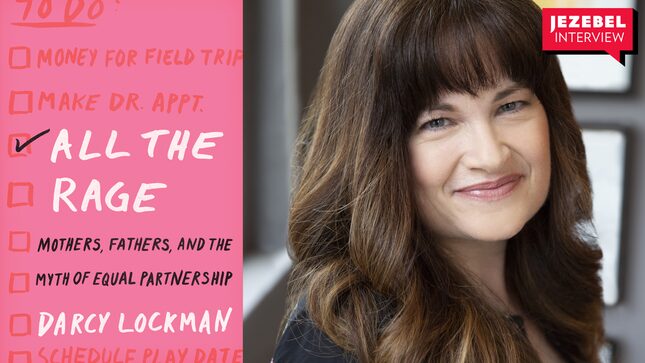'Did You Remember Diapers?': Darcy Lockman on the Elusive Fantasy of Equitable Parenting
In Depth

Before the baby arrived, Darcy Lockman believed that she and her husband would equally split the work of parenting. But her hopes were short-lived. It started with a fight when their daughter was not yet a month old and Lockman was on brief, unpaid maternity leave. Lockman’s husband—who imagined her leave as “downright hedonistic,” because she was occasionally able to drag herself to lunch with friends—wanted to return to his pre-baby routine of going to the gym after work.
“He had long days at the office and wanted to work out,” she writes in her new book, All the Rage: Mothers, Fathers, and the Myth of Equal Partnership. “I had long days at home with our newborn and wanted some relief.” They eventually agreed, after a few days of “mutual hostility,” that he would go to the gym before work, although he “seemed to hold onto the idea” that she was wrong for having such demands.
“Maybe I should just accept my role as primary parent with grace,” she thought at the time, even though she was soon going to return to work, just like her husband. “It wasn’t like he didn’t help at all.”
This dynamic continued during the first years of her daughter’s life, and then their second kid arrived. “My requests for more help were sporadically heeded, but only after some fighting and a fraught reminder or two, each one serving to reinforce the same implicit bottom line: Our children’s needs were my responsibly,” she writes. Her husband demonstrated a “striking ability to abdicate domestic burdens—to fail to even know of their existence.” Lockman writes of “small children dressed in the wrong season’s clothes, permission slips that remained in folders unsigned, the consistent failure to pack any sort of supply,” and her husband’s slightly accusatory utterance every time they got into the car, “Did you remember diapers?”
Lockman saw the same thing play out among the fathers she knew. They were “nothing like the retro stereotype of the guy who rarely left the office and refused to wipe a tiny dirty ass.” But “once they’d outpaced Don Draper in the annals of fatherhood, these men seemed content to retreat to their beds with their phones.” As a therapist, she saw this dynamic emerge as early as pregnancy—a client in maternity clothes complained that her husband had strongly held opinions about strollers but wouldn’t bother to do any research about them. What Lockman thought as she heard this client’s story was, “And so it begins.”
Once they’d outpaced Don Draper in the annals of fatherhood, these men seemed content to retreat to their beds with their phones
All the Rage is a book born from these personal and professional anecdotes, but it finds broader grounding in interviews with a sampling of 50 mothers and scads of research on household inequity. Fathers may have tripled the time spent with kids since the ’60s, but that does not translate to doing their fair share. A 2015 study found that working heterosexual couples performed 15 hours each of housework per week before having kids. After children, women did the same amount of housework while men did five hours less, and women took on eight more hours of childcare than men.
The book’s primary concern is the dynamic within heterosexual, cisgender marriages in which both parents are working, but Lockman pauses a few times to consider how things play out among same-sex parents. The answer is often: quite differently.
She investigates the reasons for these disparities, which linger despite women’s mass entry into the workforce and evolving attitudes around gender roles. This leads Lockman to explore cultural pressures around maternal perfection, tackle much of the pseudoscience around biological determinism, and review the research on gendered socialization. But it’s the anecdotes—from Lockman’s personal experiences, as well as her interviews—that summon rage. It’s all the little insults that turn out to be not so little as they stack up: the one-sided “packing of diapers, the buying of presents, the planning of meals, the searching for child care, the sorting and storage of hand-me-downs.”
Lockman acknowledges that parental inequity is in large part a structural social problem stemming from a lack of institutional support for childrearing and the unfriendliness of the American workplace toward parents (as one sociologist tells her, “workplaces still act like everyone has a wife at home”). Her proposed solutions, however, are mostly interpersonal—fathers stepping up, and mothers stepping back. “[I]f better arrangements in women’s personal lives can be achieved only through sweeping shifts in our political and economic ones, I am not, at the time of this book’s writing, optimistic for my daughters, nor for theirs,” she writes.
-

-

-

-

-

-

-

-

-

-

-

-

-

-

-

-

-

-

-

-

-

-

-

-

-

-

-

-

-

-

-

-

-

-

-

-

-

-

-

-








































